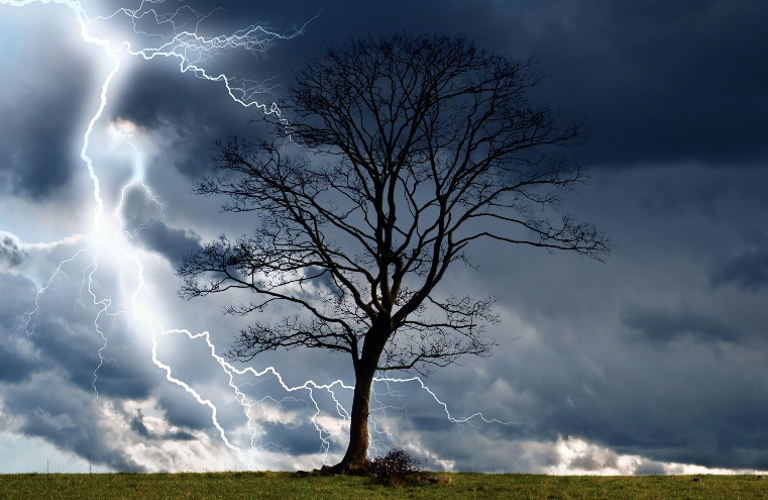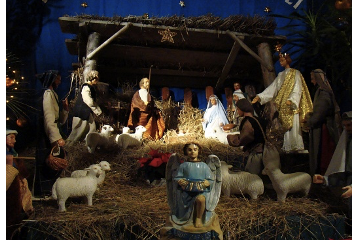I was pretty little—seven or eight, I think. Sadly, I have no one left to fact check for me.
But I remember it like it was yesterday, one of those unexpected moments in everyday life that are seared in your memory forever. And they influence you in ways you can’t know when they are happening.
Spring had sprung and Easter was on its way. For me, that meant shiny, new, white, patent leather shoes and maybe even an Easter bonnet—if we could cajole and wheedle my thrifty daddy into it. We rarely had new dresses for the occasion; we always seemed to have our pick of assorted hand-me-downs in abundance to wear. But having new accessories made me feel like I could prance down Fifth Avenue in the Easter parade with the best of them!
Easter also meant dying eggs, an egg hunt, baskets filled with chocolate, a big ham dinner, a nature walk at Parvin’s…and lots of things to do at church.
I especially loved the community Good Friday Service. It was held each year from noon to three o’clock in the afternoon at the prettiest church in town, an old stone structure adorned with incredibly brilliant stain-glass windows simply alive with stories from the Bible. We had nothing like that in our rather sparse and plain church building! I leaned back on the comfortable, cushioned pews, enthralled to be surrounded by all my Bible heroes, listening to a pipe organ sweetly saturate the sanctuary with the most beautiful of all traditional hymns. It felt like a bit of heaven on earth.
Each church in the area was assigned one of the seven last “words” Jesus spoke from the cross. One by one, in turn, a member of each congregation would read their designated portion of scripture, a musician would sing or play, and then their pastor would share a devotional thought about Jesus’ utterance. When he finished, there would be a ten-minute interlude of more majestic organ music as folks, somberly and quietly, filed in and out, staying for only the time they desired to spend or for the words they wanted to hear.
A little sleepy, a little drifty, a little distracted by the other-worldly atmosphere surrounding me, I was jarred back to reality as I watched my pastor, sitting just two rows ahead of my family, stand slowly to his feet, interrupting the speaker at the podium who was preaching on the text found in Matthew 25:46, the fifth saying. “…my God, my God, why have you forsaken me?” I sat up straighter in wonder. I could see tears streaming down his face. What on earth? Certainly this was a very sad scripture passage, but why was he disturbing the message? What had I missed?
“Brother,” my pastor spoke tenderly. “I am sorry I must stop you. I can’t let you continue preaching what is not true. God the Father did turn his back on His precious Son as He bore the sins of the world.”
He sat down.
Apparently, the speaker was expressing his personal belief that a God of love would never abandon His Son, that there must be a different interpretation of the scripture.
Uncomfortable silence. Nervous coughing. Shuffling feet. Whispers that reverberated around our little town for years and years afterward.
The speaker cleared his throat and rather awkwardly began once more. I don’t have a clue how he regrouped, and I don’t remember anything he said from then on.
But I remember what my bold pastor had so brokenly asserted…even sixty-five years later.
And I think about it every Good Friday….and many more times during the year. The forsaken Son. The interchange of the pastors is at the heart of the Gospel.
Did God really forsake His Son that He loved? At His most desperate moment? How could He?
And why?
Little Me, primarily based on my relationship with my dear earthly father (even though he was a bit of a cheapskate!), could not fathom such a thing. Not from a perfect Father. Little Me just didn’t get it. I cried at the thought of the Father turning away from His Son. What did my respected pastor mean?
And Big Me, as I’ve thought about and studied it, is quite relieved to discover that much brighter, wiser folks than I have similarly struggled with this. I know now that my childhood pastor was right in what he said that long ago afternoon. And it still brings me to tears.
Because I know Jesus was forsaken for me…
Not long ago, I found this interesting and helpful article written by Donald Macleod about those sad words Jesus cried out from the cross.
At the ninth hour Jesus cried out in a loud voice, “Eloi, Eloi, lama sabachthani?” (Mark 15:34)
Up to this point, the narrative of the crucifixion has focused on the physical sufferings of Jesus: the flogging, the crown of thorns, and his immolation on the cross. Six hours have now passed since the nails were driven home. The crowds have jeered, darkness has covered the land, and now, suddenly, after a long silence, comes this anguished cry from the depths of the Savior’s soul.
The words are an Aramaic-tinged quotation from Psalm 22, and although Matthew and Mark both offer a translation for the benefit of Gentile readers, they clearly want us to hear the exact words that Jesus spoke. At his lowest ebb, his mind instinctively breathes the Psalter, and from it he borrows the words that express the anguish, not now of his body, but of his soul.
He bore in his soul, wrote Calvin, “the terrible torments of a condemned and lost man” (Institutes, II:XVI, 10). But dare we, on such hallowed ground, seek more clarity?
There are certainly some very clear negatives. The forsakenness cannot mean, for example, that the eternal communion between the Father, the Son, and the Holy Spirit was broken. God could not cease to be triune.
Neither could it mean that the Father ceased to love the Son: especially not here, and not now, when the Son was offering the greatest tribute of filial piety that the Father had ever received.
Nor again could it mean that the Holy Spirit had ceased to minister to the Son. He had come down upon him at his baptism not merely for one fleeting moment, but to remain on him (John 1:32), and he would be there to the last as the eternal Spirit through whom the Son offered himself to God (Hebrews 9:14).
And finally, the words are not a cry of despair. Despair would have been sin. Even in the darkness God was, “My God,” and though there was no sign of him, and though the pain obscured the promises, somewhere in the depths of his soul there remained the assurance that God was holding him. What was true of Abraham was truer still of Jesus: Against all hope, he in hope believed (Romans 4:18).
Yet, with all these qualifiers, this was a real forsaking. Jesus did not merely feel forsaken. He was forsaken; and not only by his disciples, but by God himself. It was the Father who had delivered him up to Judas, to the Jews, to Pilate, and finally to the cross itself.
And now, when he had cried, God had closed his ears. The crowd had not stopped jeering, the demons had not stopped taunting, the pain had not abated. Instead, every circumstance bespoke the anger of God; and there was no countering voice. This time, no word came from heaven to remind him that he was God’s Son, and greatly loved. No dove came down to assure him of the Spirit’s presence and ministry. No angel came to strengthen him. No redeemed sinner bowed to thank him.
Who was he? He cries out in Aramaic, but he doesn’t use the greatest of all the Aramaic words, Abba. Even in the anguish of Gethsemane, distraught and overborne though he was, he had been able to use it (Mark 14:36). But not here.
Like Abraham and Isaac going up to Mount Moriah, he and the Father had gone up to Calvary together. But now Abba is not there. Only El is there: God All-mighty, God All-holy. And he is before El, not now as his Beloved Son, but as the Sin of the World. That is his identity: the character in which he stands before Absolute Integrity.
It is not that he bears some vague relation to sinners. He is one of them, numbered with transgressors. Indeed, he is all of them. He is sin (2 Corinthians 5:21), condemned to bear its curse; and he has no cover. None can serve as his advocate. Nothing can be offered as his expiation. He must bear all, and El will not, cannot, spare him till the ransom is paid in full. Will that point ever be reached? What if his mission fails?
The sufferings of his soul, as the old divines used to say, were the soul of his suffering, and into that soul we can see but dimly. Public though the cry was, it expressed the intensely private anguish of a tension between the sin-bearing Son and his heavenly Father: the whirlwind of sin at its most dreadful, God forsaken by God.
But no less challenging than the torment in Jesus’s soul is his question, “Why?“ Is it the why of protest: the cry of the innocent against unjust suffering? The premise is certainly correct. He is innocent. But he has lived his whole life conscious that he is the sin-bearer and has to die as the redemption-price for the many. Has he forgotten that now?
Or is it the why of incomprehension, as if he doesn’t understand why he’s here? Has he forgotten the eternal covenant? Perhaps. His mind, as a human mind, could not be focused on all the facts at the same time, and for the moment the pain, the divine anger, and the fear of eternal perdition (the cross being God’s last word) occupy all his thoughts.
Or is it the why of amazement, as he confronts a dreadfulness he could never have anticipated? He had known from the beginning that he would die a violent death (Mark 2:20), and in Gethsemane he had looked it in the eye, and shuddered. But now he is tasting it in all its bitterness, and the reality is infinitely worse than the prospect.
Never before had anything come between him and his Father, but now the sin of the whole world has come between them, and he is caught in this dreadful vortex of the curse. It is not that Abba is not there, but that he is there, as the Judge of all the earth who could condone nothing and could not spare even his own Son (Romans 8:32).
Now, Jesus’s mind is near the limits of its endurance. We, sitting in the gallery of history, are sure of the outcome. He, suffering in human nature the fury of hell, is not. He is standing where none has stood before or since, enduring at one tiny point in space and in one tiny moment of time, all that sin deserved: the curse in unmitigated concentration.
But then, suddenly, it is over. The sacrifice is complete, the curtain torn, and the way into the Holiest opened once and for all; and now Jesus’s joy finds expression in the words of another psalm, Psalm 31:5. In the original, it had not contained the word Abba, but Jesus inserts it: “Father, into your hands I commit my spirit” (Luke 23:46).
We have no means of knowing what intervened between the two cries. We know only that the Cup is drained and the curse exhausted, and that the Father now proudly holds out his hands to the spirit of his Beloved Son.
Donald Macleod (1940–2023) served as professor of systematic theology at the Free Church of Scotland College in Edinburgh for more than thirty years. He authored many books, including The Person of Christ and Christ Crucified.
John MacArthur says, “In some way and by some means, in the secrets of divine sovereignty and omnipotence, the God Man was separated from God for a brief time at Calvary, as the furious wrath of the Father was poured out on the sinless Son, who in matchless grace became sin for those who believe in Him.”
Oh, I believe in Him! I just have to. He bore the wrath of God, satisfied the wrath of God, for MY sin—so I don’t have to.
What a loving thing to do!
Can we carelessly and foolishly ignore this One who so willingly and horrifically sacrificed Himself on our behalf?
The One Who was forsaken by God so we never will be?
The Father’s love did not restrain Him from turning away from His Son; the Father’s love compelled Him to---for me and for you.
One pastor got it right that distant Good Friday.
But one didn’t.
I’m so thankful the one who did was mine and I witnessed it. He set me on a lifelong journey to seek and know the truth, to wrestle with hard verses and ask questions when I didn’t get it, and to boldly stand up for what God’s Word is saying regardless of the backlash, regardless of the pain. I only wish I was better at it. But He also stirred in me a deep love and gratitude for my precious Savior—and not just at Eastertime.
I hope he has stirred you as well.
He will be smiling in heaven.
—Eileen Hill














